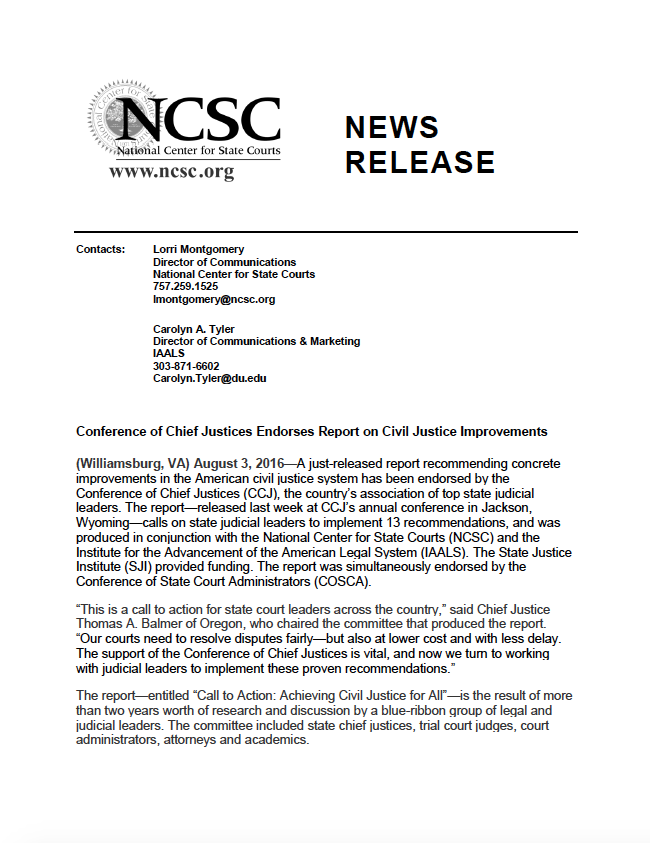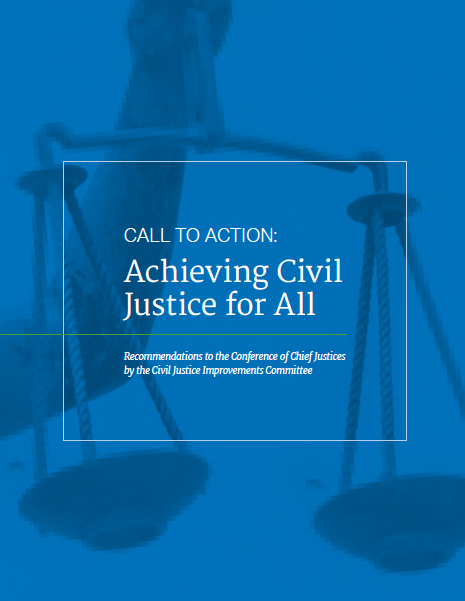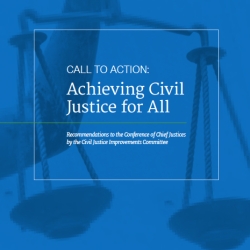Conference of Chief Justices Endorses Report on Civil Justice Improvements
 A just-released report recommending concrete improvements in the American civil justice system has been endorsed by the Conference of Chief Justices (CCJ), the country’s association of top state judicial leaders. The report—released last week at CCJ’s annual conference in Jackson, Wyoming—calls on state judicial leaders to implement 13 recommendations, and was produced in conjunction with the National Center for State Courts (NCSC) and the Institute for the Advancement of the American Legal System (IAALS). The State Justice Institute (SJI) provided funding. The report was simultaneously endorsed by the Conference of State Court Administrators (COSCA).
A just-released report recommending concrete improvements in the American civil justice system has been endorsed by the Conference of Chief Justices (CCJ), the country’s association of top state judicial leaders. The report—released last week at CCJ’s annual conference in Jackson, Wyoming—calls on state judicial leaders to implement 13 recommendations, and was produced in conjunction with the National Center for State Courts (NCSC) and the Institute for the Advancement of the American Legal System (IAALS). The State Justice Institute (SJI) provided funding. The report was simultaneously endorsed by the Conference of State Court Administrators (COSCA).
“This is a call to action for state court leaders across the country,” said Chief Justice Thomas A. Balmer of Oregon, who chaired the committee that produced the report. “Our courts need to resolve disputes fairly—but also at lower cost and with less delay. The support of the Conference of Chief Justices is vital, and now we turn to working with judicial leaders to implement these proven recommendations.”
 The report—entitled “Call to Action: Achieving Civil Justice for All”—is the result of more than two years worth of research and discussion by a blue-ribbon group of legal and judicial leaders. The committee included state chief justices, trial court judges, court administrators, attorneys and academics.
The report—entitled “Call to Action: Achieving Civil Justice for All”—is the result of more than two years worth of research and discussion by a blue-ribbon group of legal and judicial leaders. The committee included state chief justices, trial court judges, court administrators, attorneys and academics.
The recommendations are designed to meet the challenges of contemporary civil caseloads by taking advantage of modern technologies and highly trained court staff to provide effective oversight and timely intervention to move civil cases to resolution.
They present a comprehensive framework that features:
- Procedural reforms implemented in a variety of state courts that have been empirically tested and shown to substantially improve civil case processing;
- A right-sized staffing model for civil case processing that delegates substantial responsibility for routine caseflow management to specially trained professional staff, supported by effective case automation, permitting judges to focus on tasks that require their unique training and expertise;
- A Pathway Approach to caseflow management that assigns cases at filing based on the expected amount of court involvement needed to resolve the case, but offers sufficient flexibility for reassignment as the needs of the case change over time; and
- A renewed focus on high-volume calendars that comprise the vast majority of contemporary civil caseloads, especially improved access for self-represented litigants, and greater attention to uncontested cases and greater scrutiny of claims to ensure procedural fairness for litigants.
“We need a legal process that can fairly and promptly resolve disputes for all Americans,” said Mary McQueen, president of the National Center for State Courts. “These recommendations, when implemented, will enhance public confidence in our system of civil justice.”
“The civil justice system is mired in misperceptions and inefficiencies,” said IAALS Executive Director and former Colorado Supreme Court Justice Rebecca Love Kourlis. “The recommendations for change that the Chief Justices just approved are grounded in broad experience and data; and they are innovative, forward-looking, and inspiring.”
The full report is available here. Both NCSC and IAALS have committed to working with state courts to implement the recommendations.





